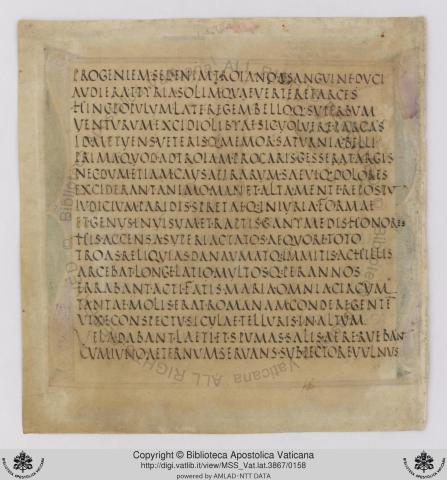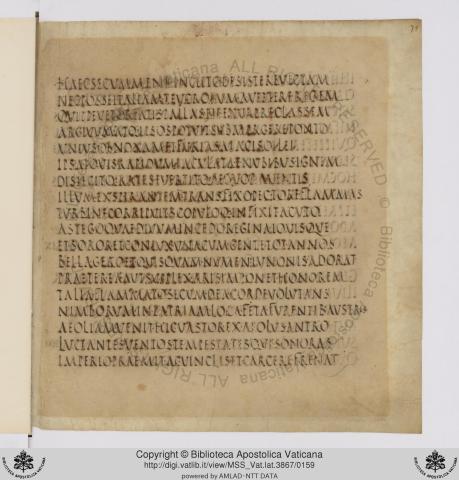Vix ē cōnspectū Siculae tellūris in altum
vēla dabant laetī et spūmās salis aere ruēbant,35
cum Iūnō aeternum servāns sub pectore vulnus
haec sēcum: 'Mēne inceptō dēsistere victam
nec posse Ītaliā Teucrōrum āvertere rēgem!
Quippe vetor Fātīs. Pallasne exūrere classem
Argīvum atque ipsōs potuit summergere pontō40
ūnius ob noxam et furiās Āiācis Oīleī?
Ipsa Iovis rapidum iaculāta ē nūbibus ignem
disiēcitque ratēs ēvertitque aequora ventīs,
illum exspīrantem trānsfīxō pectore flammās
turbine corripuit scopulōque īnfīxit acūtō;45
ast ego, quae dīvum incēdō rēgīna Iovisque
et soror et coniūnx, ūnā cum gente tot annōs
bella gerō. Et quisquam nūmen Iūnōnis adōrat
praetereā aut supplex ārīs impōnet honōrem?'
notes
Manuscripts: M | R 34-36, 37-49
A soliloquy of Juno. She bitterly complains that she cannot defeat the Trojan fleet (Storr).
We catch but a brief glimpse of the Trojan refugees in 34–5: they are sailing happily off the coast of Sicily: Vix e conspectu Siculae telluris in altum vela dabant laeti et spumas salis aere ruebant, … but then Juno’s contemplations and their aftermath take center stage. ... [full essay]
34: Vergil following the example of Homer plunges at once “into the heart of his subject” (in medias res) (Page). e conspectu Siculae telluris: “out of sight of Sicily” (Carter). in altum: this neuter substantive generally denotes either the sea at a distance from land or the depth of the sky (Conway).
35: dabant: “were spreading.” The imperfect is picturesque (F-B). ventis is understood after dabant (Frieze). laeti: “happy,” because near Italy (Walpole). “Joyfully,” an adj. used in an adverbial sense (Robertson). spumas salis aere ruebant: note the alliterative effects (F-B). spumas: plur. for sing. (Robertson). salis: sal is frequent for mare (Frieze). aere: because the prows were sheathed with bronze (F-B). ruebant: “were ploughing”; ruere may be used transitively in poetry (F-B). = eruebant (Carter).
36: sub pectore: “deep in her breast,” with a derivative notion of secrecy (Conington). In the poets sub often means, not “under,” but “in the lower part of,” “down in,” as here (Bennett).
37: haec secum: sc. loquitur (Walpole). In animated narrative the verb of saying is often omitted (F-B). mene: the personal pronoun with the enclitic -ne (F-B). desistere: the inf. is used with subject-accusative to express strong indignation (Wetherell). The infinitive of indignant exclamations (F-B) (AG 462).
38: Italia: abl. after avertere (Robertson). Teucrorum: the Trojans are so called as being descendants of Teucer, the first king of Troy (F-B). regem: the word rex is often used equivalent to dux or princeps. Aeneas was a leader or prince, but not, strictly speaking, a king (Carter).
39–40: classem Argivum: “a,” not “the, fleet of the Greeks” (Frieze).
39: quippe: ironical, “doubtless” (F-B). fatis: Dat. = fato (Walpole). Pallasne: -ne is used where num might be expected (F-B).
40: Argivum: = Argivorum (F-B). ipsos: “the men,” as contrasted with classem (F-B). ponto: Either instrumental (means) or locative ablative (G-K). After mergo and submergo the ablative, either with sub or in, or without a preposition, is used (Frieze).
41: the structure is ob noxam unius (hominis) et furias Aiacis Oilei (Henry). unius: “of one alone,” as opposed to ipsos, a number of men (F-B). Pallas was angry with Ajax alone, and friendly to the rest of the Greeks, whereas Juno was angry with the whole of the Trojan race (Frieze). Oilei: A patronymic genitive (Storr). The genitive of the noun Oileus, not of the adjective Oileus (Frieze). Dependent on Aiacis; the ei is one syllable by synizesis (F-B) (AG 603c, N). ob noxam et furias: Either (1) = noxam furiosam by hendiadys, or (2) furias explains noxam (epexegesis) (Wetherell). On the night of Troy’s fall, Ajax attacked Cassandra in the sanctuary of Minerva. The goddess, in anger, destroyed him with his fleet when returning to Greece (F-B) (Smith’s Dictionary, s.v. Ajax, son of Oileus).
42: ipsa: “with her own hands,” because Jupiter was the god who properly wielded the lightning-bolts (F-B).
44: illum: “him, however.” In prose, a sed or tamen would be needed, but here the strong position is enough. The asyndeton is forcible (F-B). In emphatic contrast with rates (C-R). expirantem: “gasping out” (Comstock). Not a literal breathing through the throat but simply of bursting into flame (Conway). transfixo: i.e., by the thunderbolt (Walpole). pectore: ablative of separation (Bennett). flammas: i.e., the lightning (Walpole).
45: turbine: abl. of means (Walpole). infixit: infigo takes indifferently the dative or ablative (Frieze).
46: ast: an archaic form, and furnishing a long syllable instead of the short at (F-B). ego: in strong contrast with Pallas (Walpole). divum: for divorum (Frieze) (AG 49 note). incedo: the word is picturesque, denoting stateliness or majesty of movement (F-B). A majestic walk (Frieze).
47: et soror et coniunx: Juno and Jupiter were children of Saturn (Frieze) (Smith’s Dictionary s.v. Cronus). tot annos: acc. of duration of time (Robertson) (AG 423).
48: bella: plural to suit tot annos (Walpole). The plural in accord with the idea of many varied attempts to effect the destruction of the Trojans (F-B). gero: the present often denotes an action continuing in the present, but begun in the past (Wetherell) (AG 466). et: introduces an indignant question (F-B). quisquam: implies a negative answer (Walpole) (AG 312). Iunonis: more forcible than meum would have been (Frieze). An element of pathos is added by this reference of Juno to herself in the third person (Bennett). adorat: the present is occasionally used for the future in lively or earnest discourse, indicating strong assurance (Frieze) (AG 468).
49: praeterea: “hereafter” (F-B). aris: dative after imponet (Robertson) (AG 370). honorem: “sacrifice,” by metonymy, because it confers honor (F-B).
vocabulary
cōnspectus, ūs, m.: a seeing or viewing; view, sight, 1.34; presence, 6.108; mediō in cōnspectū, in the midst of the gazing assembly. (cōnspiciō)
Siculus, a, um: adj. (Siculī), pertaining to the Siculi, an ancient race, part of which migrated from Latium to Sicily; Sicilian, 1.34, et al.
altum, ī, n.: the deep; the lofty; the deep sea, the main, the deep, 1.3; the sky, heaven, air, 1.297; from far, far-fetched, remote, 8.395. (altus)
vēlum, ī, n.: a cloth; sail, 1.103, et al.; a curtain, canvas, covering, 1.469.
spūma, ae, f.: froth, foam, spray, 1.35; pl., spray, 3.208. (spuō, spit)
sāl, salis, m.: salt; brine, salt water, 1.173; (meton.), the sea, 1.35.
ruō, ruī, rutus, 3, n. and a.: to fall with violence; tumble down, fall, freq.; fall in battle, 10.756; of the sun, go down, set, 3.508; rush forward, 2.64; of the chariot of Nox, hasten up; ascend, rise, 2.250; advance, 10.256; plunge, rush, 2.353; flee, 12.505; tremble, quake, 8.525; hasten, pass away, 6.539; cause to fall; cast down, 9.516; plow, 1.35; cast, throw up, 1.85; throw up or together, 11.211.
Iūnō, ōnis, f.: Juno, the Sabine and Roman name for the wife and sister of Jupiter, daughter of Saturn, 1.4, et al.; Iūnō īnferna, the Juno of the lower world, Proserpine, 6.138.
inceptum, ī, n.: a beginning; deliberation, 11.469; undertaking, design, purpose, 1.37; measure, movement, 12.566. (incipiō)
dēsistō, stitī, stitus, 3, n.: to cease, desist, w. abl., 1.37; w. dat., 10.441.
Ītalia, ae (Ī by poetic (epic) license), f.: Italy, 1.2, et al.
Teucrī, ōrum, m.: the Trojans, descendants of Teucer, 1.38, et al.; adj., Teucrian, Trojan, 9.779, et al. (Teucer)
āvertō, vertī, versus, 3, a.: to turn (anything) away from, followed by an abl. with or without a prep., 1.38, et al.; turn or drive away, 1.472, et al.; transfer, with acc. of place, 4.106; drive away, end, 4.547; neut. by omission of se, to turn away, 1.402; (pass.), avertī, as middle or dep., with acc., to be averse to; to shun, loathe.
Pallas, adis, f.: Pallas Athena, identified by the Romans with Minerva, 1.39; rāmus Palladis, the bough sacred to Pallas, the olive, 7.154.
exūrō, ussī, ūstus, 3, a.: to burn out, consume with fire; burn up, 1.39; dry up, parch, 3.141; burn out, purge, 6.742.
Argīvus, a, um: adj. (Argos), belonging to Argos; Argive; Greek, 2.254; subst., Argīvī, ōrum, Argives, Greeks, 1.40.
possum, potuī, posse, irreg. n.: to be able; can, 1.242, et al.; to avail, have influence, power, 4.382. (potis and sum)
summergō, mersī, mersus, 3, a.: to plunge beneath; submerge, sink, 1.40. (sub and mergō)
noxa, ae, f.: hurt, harm; offense, outrage, violence, 1.41. (noceō)
furiae, ārum, f.: rage, fury, madness, frenzy, 1.41, et al.; vengeance, 8.494; personif., Furiae, ārum, the goddesses of vengeance, the Furies, Allecto, Megaera, and Tisiphone; the Avengers, 3.331; for the Harpies, 3.252. (furō)
Aiāx, ācis, m.: 1. Ajax, the son of Telamon. 2. Ajax, the son of Oileus, called also Ajax the Lesser, 1.41; 2.414.
Oīleus (trisyll.), eī, ī, or eos: patronymic, son of Oileus, the king of Locris, 1.41.
Iuppiter, Iovis, m.: Jupiter, son of Saturn and Rhea, and king of the gods, 1.223; Iuppiter Stygius, Pluto, 4.638.
rapidus, a, um: adj. (rapiō), that tears away; violent, fierce; swiftly moving, rapid, 1.42; speedy, quick, prompt, 5.513.
iaculor, ātus sum, 1, dep. n. and a.: to hurl the javelin; to dart; throw, cast, hurl, 1.42. (iaculum)
nūbēs, is, f.: a cloud, 1.516, et al.; storm, 10.809; the air, 12.856; (fig.), flock, multitude, 7.705.
dīsiciō, iēcī, iectus, 3, a.: to throw, cast asunder; overthrow, demolish, 8.355; scatter, disperse, 1.70; cleave, 12.308. (dis- and iaciō)
ratis, is, f.: a raft, float; bark, boat, ship, 1.43, et al.
ēvertō, vertī, versus, 3, a.: to upturn, 1.43; overthrow, demolish, destroy, 2.603.
exspīrō, āvī, ātus, 1, a. and n.: to breathe out, 1.44; to expire, die, 10.731.
trānsfīgō, fīxī, fīxus, 3, a.: to pierce, transfix, 1.44.
turbō, inis, m.: a tornado, whirlwind; storm, tempest, 1.442; whirling cloud, 3.573; wind accompanying the lightning; lightning-blast, 1.45; 6.594; whirling or stormy force, 11.284, et al.; a whirling top, a child's top, 7.378. (cf. turba)
corripiō, ripuī, reptus, 3, a.: to take completely or eagerly; to grasp, snatch, seize, catch, 1.45; hurry away, 1.100; tear away; hasten on, take, 1.418; raise quickly, rouse, 4.572; sē corripere, to hasten away, 6.472. (com- and rapiō)
scopulus, ī, m.: a projecting ledge of rock; a high cliff or rock, 1.180; crag, 1.45; ledge, reef, 1.145; detached rock, fragment of rock, 12.531.
īnfīgō, fīxī, fīxus, 3, a.: to fasten in or upon, w. dat. or abl., 1.45, et al; thrust, 12.721; p., īnfīxus, a, um, thrust deeply, deep, 4.689.
acūtus, a, um: sharpened, pointed, sharp, 1.45. (acuō)
incēdō, cessī, cessus, 3, a. and n.: to step onward; walk, especially with pomp or dignity; advance, 1.497; move (for am), 1.46, et al.; march, proceed, 9.308.
rēgīna, ae, f.: a queen, 1.9; princess, 1.273. (rēx)
Iuppiter, Iovis, m.: Jupiter, son of Saturn and Rhea, and king of the gods, 1.223; Iuppiter Stygius, Pluto, 4.638.
Iūnō, ōnis, f.: Juno, the Sabine and Roman name for the wife and sister of Jupiter, daughter of Saturn, 1.4, et al.; Iūnō īnferna, the Juno of the lower world, Proserpine, 6.138.
adōrō, āvī, ātus, 1, a.: to pray to; supplicate, worship, adore, 1.48.
supplex, icis: adj. (supplicō, beseech), kneeling, entreating, suppliant, 3.439; subst., supplex, icis, c., a suppliant, 2.542.


